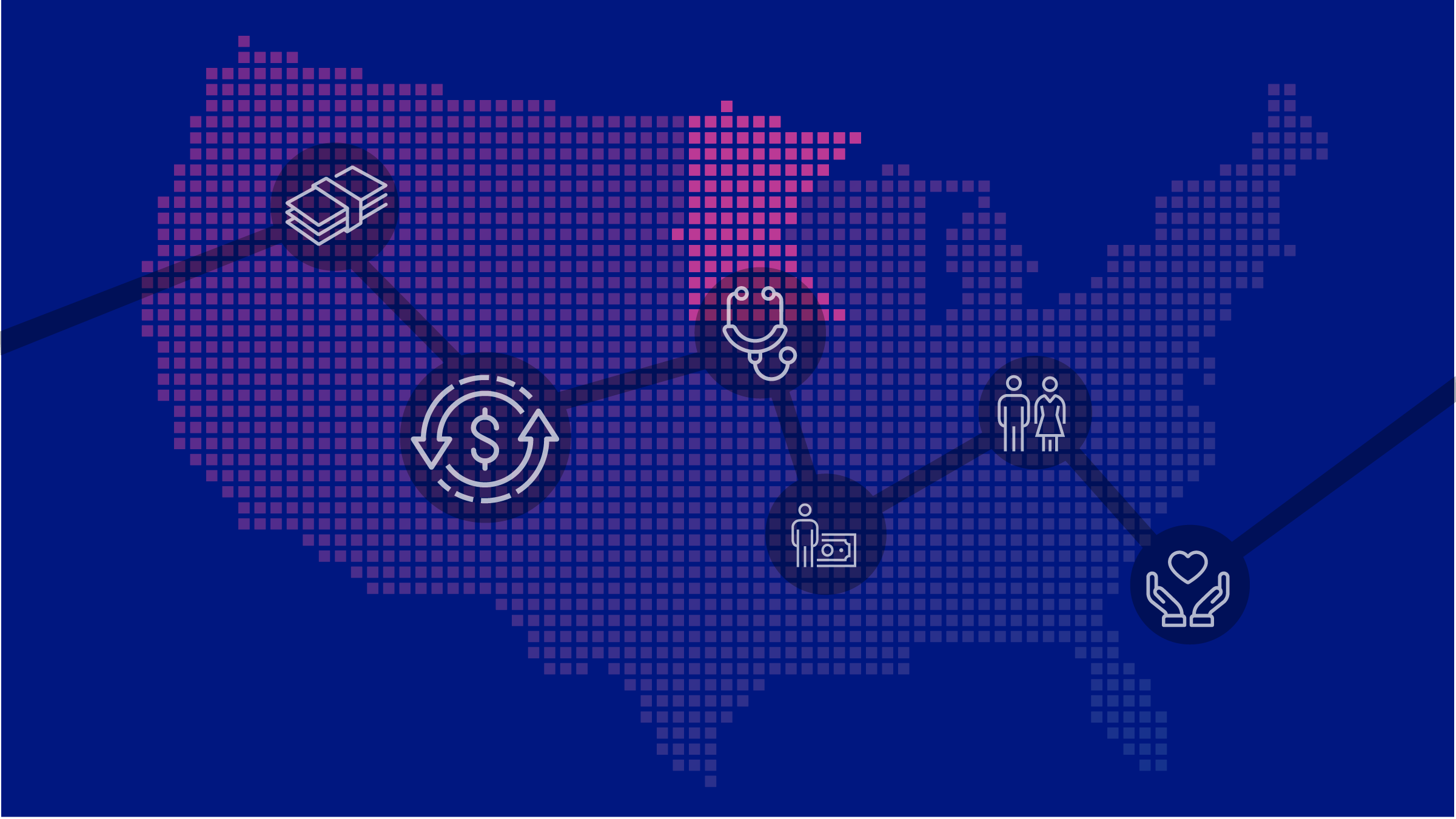During Tracy Fischman’s 11 years of leadership, Prepare + Prosper in St. Paul, Minnesota, has grown from an organization primarily focused on free tax preparation for low-income individuals to a multi-faceted provider of financial-wellness services in low-income communities across the Twin Cities region. Those services include FAIR Financial, a financial-inclusion program aimed at the roughly 194,000 Minnesota households that are financially underserved.1 Provided in partnership with Sunrise Banks, FAIR Financial offers checking, savings, and credit-building accounts alongside light-touch financial coaching and support.
The State of Minnesota’s stay-at-home order and the social distancing required by COVID-19 forced Prepare + Prosper to suspend its in-person tax preparation services and quickly pivot to redesign its program delivery just as the demand for its services was at its peak. The implications became magnified as the design of the CARES (Coronavirus Aid, Relief, and Economic Security) Act’s Economic Impact Payments delivered key household financial relief through the tax system.
Directing Prepare + Prosper’s holistic approach to financial wellness has given Fischman insights that are useful to both employers and policymakers during the COVID-19 pandemic and beyond. She recently sat down with us—virtually—to share some of those insights and discuss her organization’s efforts to reposition its work during this crisis. The following is an edited transcript of conversations that took place in late March and mid-April of 2020.
Ben Horowitz: How can employers better support their employees’ financial wellness—in times of crisis, but also in general?
Tracy Fischman: While each employee’s circumstances are unique, there are many ways for employers to support financial health and well-being. It’s important for employers to assess and understand their employees’ needs, and design and adapt their programming to reflect those needs while also providing a core and clear set of benefits. Confidentiality and trust are paramount, too. We’ve seen that partnerships with outside, trusted providers of financial-wellness programs can be beneficial in providing specialized support and enhancing confidentiality.

Employers may also consider offering more holistic financial-wellness options for their employees that go beyond retirement matches and paid leave. Holistic financial wellness considers a household’s complete picture, from navigating day-to-day finances to weathering financial emergencies and setbacks. This approach allows individuals to consider their options for managing their income, short-term and long-term savings, access to financial products, and debts. It also acknowledges the importance of people’s confidence and knowledge about their finances, and takes into account whether people have the time and resources to plan for future financial goals and dreams.
There’s growing attention and research on the correlation between investments that support employees’ financial wellness and improvements in productivity and retention. Employers understand that financially healthy workers can more easily show up for and focus on work. It’s a win-win for both employers and employees.
You mentioned the importance of employers using external partnerships to help support their employees’ financial wellness. What role do partnerships have in your own work?
Partnerships are core to our success, and essential for providing services across the region. We have hundreds of partner organizations that refer their clients or customers to us because they know and trust our work. Issues around money and finances are often stressful and very private, so having that trust from our partners—and their respective customer bases—is critical.
We ground our work, and how we approach service delivery, in a way that’s responsive to the needs of our customers, whom we consider partners as well. Listening to our customers is a baseline for helping people navigate the complex financial-services landscape and make informed decisions about their financial futures. For example, our financial coaching program is completely focused on people doing their own goal setting and action planning. We offer tools, support, and an accountability partner so they can make the space for and the necessary behavior changes to meet those goals, whether they’re budgeting, saving, reducing debt, increasing assets, or even changing their relationship with money.
Partnerships are also important because they allow us to learn from communities, which enables us to iterate and do our work in an adaptive way. For example, when we designed FAIR Financial, we conducted community listening sessions with the organizations and people that we were hoping to reach. We heard that fee certainty, trust, transparency, and the ability to feel in control of one’s money were important. We took that valuable input from the community and built it into our product design and into our proposal for finding a banking partner that would work with us in addressing the many barriers that communities—particularly communities of color—experience in their financial lives.
Our outreach also helped us identify the importance of partnerships in getting the word out and enrolling people in these FAIR accounts, which we’ve done through nonprofits like Better Futures Minnesota and Build Wealth MN, and through other partners like the City of Saint Paul and its library system.
COVID-19 hit the U.S. during peak tax preparation season. What does reduced access to Prepare + Prosper and other free tax preparation sites mean to the people you serve?
I don’t think we can overstate the impact of having to suspend our in-person tax services at a time when the magnitude of demand was at its greatest. At our tax preparation sites in 2019, we helped nearly 4,000 of our customers file for the EITC (Earned Income Tax Credit). Refundable tax credits like the EITC reduce poverty and help people become more financially secure. Research even connects the EITC to increases in people’s physical health.
It’s not just tax preparation that was affected, but a whole suite of financial services we offer. For many households, income from the EITC is part of their financial bottom line, and often an opportunity to catch up on financial obligations and even build a savings cushion. To facilitate that, we offer people vehicles for saving through low-barrier, low-cost savings accounts. At a more basic level, we give people a safe way to directly deposit their refunds and paychecks onto a low-cost prepaid debit card, establish or re-establish a banking relationship by opening a FAIR checking account, and review their credit reports and connect to a financial coach in our Money Mentors program.
I think it’s important to recognize that the reach of the crisis goes beyond access to services like ours. The impact resource scarcity has on people’s ability to process long-term decisions is well documented. Human brains are wired to prioritize short-term needs, even if a different path might be more advantageous in the long-term.2 COVID-19 is ramping up the stress in people’s lives—many are losing work, or their kids may be home with them, and they may be worried about their family’s health. Data are showing that the pandemic is disproportionately affecting communities of color and people with low and volatile incomes. The impacts of scarcity are going to compound, which is why it’s essential that we as a sector get clear information, resources, and solutions to people as quickly as possible.

From an operational perspective, how is Prepare + Prosper adapting to this crisis in real time?
We made the difficult decision to suspend in-person tax services to do our part to protect people’s safety and health during the pandemic. We knew it was important to continue our work of promoting financial health and responding to the increased financial insecurity that this pandemic is causing, so our teams quickly adapted our program delivery models to help meet the immediate needs of our customers. We’re now providing remote and virtual support for tax filing and are enrolling people in bank accounts virtually. That’s putting tax credits and economic impact payments into the hands of people who, from a health and financial perspective, are most impacted during this crisis.
We’re staying up-to-date on rapidly changing guidance from the IRS so we can remain a solid source of information for our customers and partners during a time when scams and misinformation are widespread. We’re trying our best to provide current, reliable information to thousands of people via phone calls, email, social media, and partners’ communication channels. And we’re planning for continued physical distancing needs, and thus phasing in our in-person services in a new way.
The bright spot in all this is that we’re experimenting with virtual program models that expand access and address some barriers to participation. We’re now offering our Money Mentors one-on-one financial coaching sessions and peer support virtually, and we worked with our FAIR bank partner, Sunrise Banks, to sign people up for new bank accounts remotely. These new models have the potential to reach people across greater geographies and allow for more flexibility for those who struggled to get to our offices in person due to child care and transportation issues.
Like so many organizations, we’re also grappling with a lot as an employer. As I noted, we’ve been following public health guidelines, and we’re now slowly returning to small levels of in-person service, which means we need to have adequate supplies and protections, protocols, training for our staff and volunteers, and restructured space to ensure physical distancing. We’re simultaneously doing scenario planning and preparing for continued risks during the next year, so our service-delivery models must continue to account for that. We expect that our staffing and volunteer needs will remain significant but will look different. Like so many, we’re also operating in an uncertain funding environment. Given the impact on our outcomes this year due to suspended or reduced services, and the fact that so much of our work as a field is tied to our outcomes, we expect our expenses and revenues will change, but we don’t know what those changes will look like.
Thinking about what we’ve discussed—the impact of scarcity on people’s decision-making, the pre-existing gaps in access to financial services, and your holistic view of financial wellness—what are some of the implications for public policy, during and after the COVID-19 crisis?
The crisis has magnified existing system and policy challenges. Several of our prior policy priorities remain pressing. For example, we continue to push for more equity in our tax codes—federal and state—to support lower-income people. That includes expanding the EITC for currently eligible households and for those currently ineligible, or barely eligible, and providing income supports for people whose employment has been reduced or eliminated in the midst of COVID-19. We believe policies in the tax code and in our safety net system should facilitate, not hinder, savings. Allowing and incentivizing people to save some of their tax refunds when possible, and ensuring that their savings won’t preclude them from accessing safety net programs, is paramount.
From our perspective, considering our holistic approach to financial well-being, policy solutions must account for short-term, medium-term, and long-term needs. For households, being able to cover day-to-day expenses through income and other supports—for food, housing, transportation, child care, and more—is a baseline. In the midst of COVID-19, the need to support these core life components is immediate and magnified. At the federal level, funding to support these basic needs is urgently needed, and it must include flexible relief money for states, as well as support for the nonprofit sector that serves as a lifeline for so many. What’s more, we believe relief should be targeted to those who need it the most, and should be offered regardless of their immigration status.
Looking beyond immediate needs, we see many policy opportunities to support short- and mid-term savings for emergencies, financial goals, education, retirement, and more. The liquid savings gap, which was significant and unacceptably high pre-COVID-19, will only grow in the coming months if policymakers don’t prioritize our most vulnerable communities. Policy needs also include protecting consumers from price gouging, predatory financial practices like payday lending and car title lending, and more.
Finally, we believe policy responses should address the gaps in our nation’s credit system and the harmful effects of those gaps on low-income people and people of color. Access to credit is a fundamental component of wealth-building, but it’s also an element that supports access to things like employment, housing, and affordable insurance. What’s more, racism and disenfranchisement contribute to an unacceptably wide racial wealth gap, compounded by and correlated with lack of access to community investments, credit and other financial tools, and basic and safe banking products. Policymakers must account for these historic, ongoing barriers to financial well-being.
Endnote
1 Federal Deposit Insurance Corporation, 2017 FDIC National Survey of Unbanked and Underbanked Households.
2 Psychological and economic research strongly suggests that when people don’t have the resources to meet their basic financial needs, they are more likely to make financial decisions that will have negative consequences in the long term. For more on this, see the “You 2.0: Tunnel Vision” episode of National Public Radio’s Hidden Brain podcast, which discusses work by behavioral science researchers Eldar Shafir and Sendhil Mullainathan.






